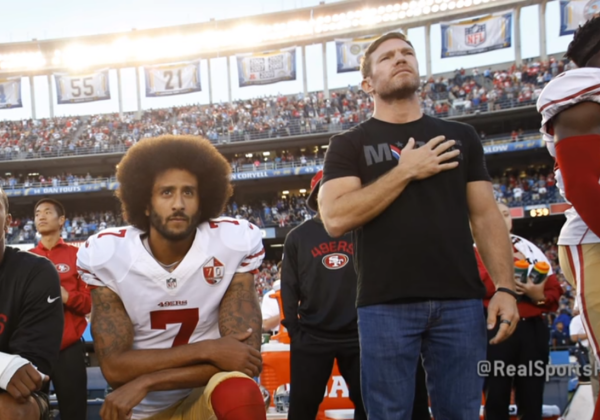“I never really pictured myself being involved in activism,” says former Green Beret Nate Boyer, B.S. ’13, who served six years and completed several tours of duty in Iraq and Afghanistan before becoming a Longhorn football player as a walk-on with no previous organized football experience. “But I always believed there was another way to approach people you don’t understand, a way to show them your side and share your opinion without shouting, because no one is going to hear you and treat you with respect that way.”
After graduating from the Department of Kinesiology and Health Education with a physical culture and sports degree, he was signed by the Seattle Seahawks. He later returned to the University of Texas at Austin to earn a master’s in advertising.

And though he never saw himself becoming an activist, he became an integral part of a national conversation about sport and protest in 2016. That’s when San Francisco 49ers player Colin Kaepernick began sitting during the national anthem to protest police brutality. The action would prove polarizing, with people staunchly on either side of the debate regarding this form of protest. Because of his experience as both a military veteran and an NFL player, Boyer was asked by Army Times to submit a column in response.
The Letter that Went Around the World
Says Boyer, “At first, when Colin was sitting, we were in the middle of an election season and we felt pretty divided as a country. I knew my opinion was not going to help the situation. But as someone who was in the military and served our country, like any veteran who serves and fights for a people, what hurts more than anything was how divided we are. I didn’t want to add to that. I wanted to write a letter that just explained where I’m coming from, a letter that did not tell anybody to do anything or ask anybody to do anything.”
“An Open Letter to Colin Kaepernick from a Green Beret-turned-long snapper” went viral. Says Boyer, “I think a lot of people were starved for reason. Most of us are reasonable people, but we were only hearing the loud voices on the extremes of each side. A person might lean left or lean right but most people can understand why people may feel the way they do, even if they disagree with them. I think the letter gave people that reasonable voice they were looking for.”
When Boyer and Kaepernick met, Boyer relayed to Kaepernick that soldiers often honor fallen soldiers by kneeling in front of their graves. The discussion influenced Kaepernick and other NFL players to begin kneeling, rather than sitting, during the anthem.
Teamwork Helps Bridge Cultural Divides
Boyer says that his time in the military and his time being deployed in the Middle East helped him develop this mindset. “In the military you are on a team and you will work with people from all over the world who have various backgrounds and upbringings. You may not always like everybody, but because you go through difficult things together, you work hard together and grow to love one another and are willing to take a bullet for them.”
“Deployment also contributed to that outlook,” says Boyer. “The culture, customs, and religion of people in Iraq or Afghanistan, for example, are very different from what we may be typically used to, but especially in the Special Forces–when all our work is alongside indigenous people–we live with them and train with them, and they become our brothers in arms as well. We are all human beings. Most want what’s best for their families: they want safety, security, and equality. Understanding that is key.”
Boyer says those same skills were found in his time as a Longhorn at Texas.
“Coming to a place like Texas, especially being an older student, you come into a football locker room where it’s 19- to 22-year-old kids, and where again the environment is very diverse. People are from all over the place and from very different families. And, like the military, you go through training camp and tough times. You argue about things, and there are people you don’t necessarily get along with. The more you are around them, though, the more you let that stuff go.”
“Sports and the military, more than anything I can think of in our society,” says Boyer, “are spaces where we get people from all over the map and different opinions, levels of education and socioeconomic statuses, and you work together and build this bond and color lines go away. It’s special to see.
“Those experiences helped me a lot when it came to this activism,” he says.
Interested in hearing more from Boyer? Watch his Alderson Lecture.

